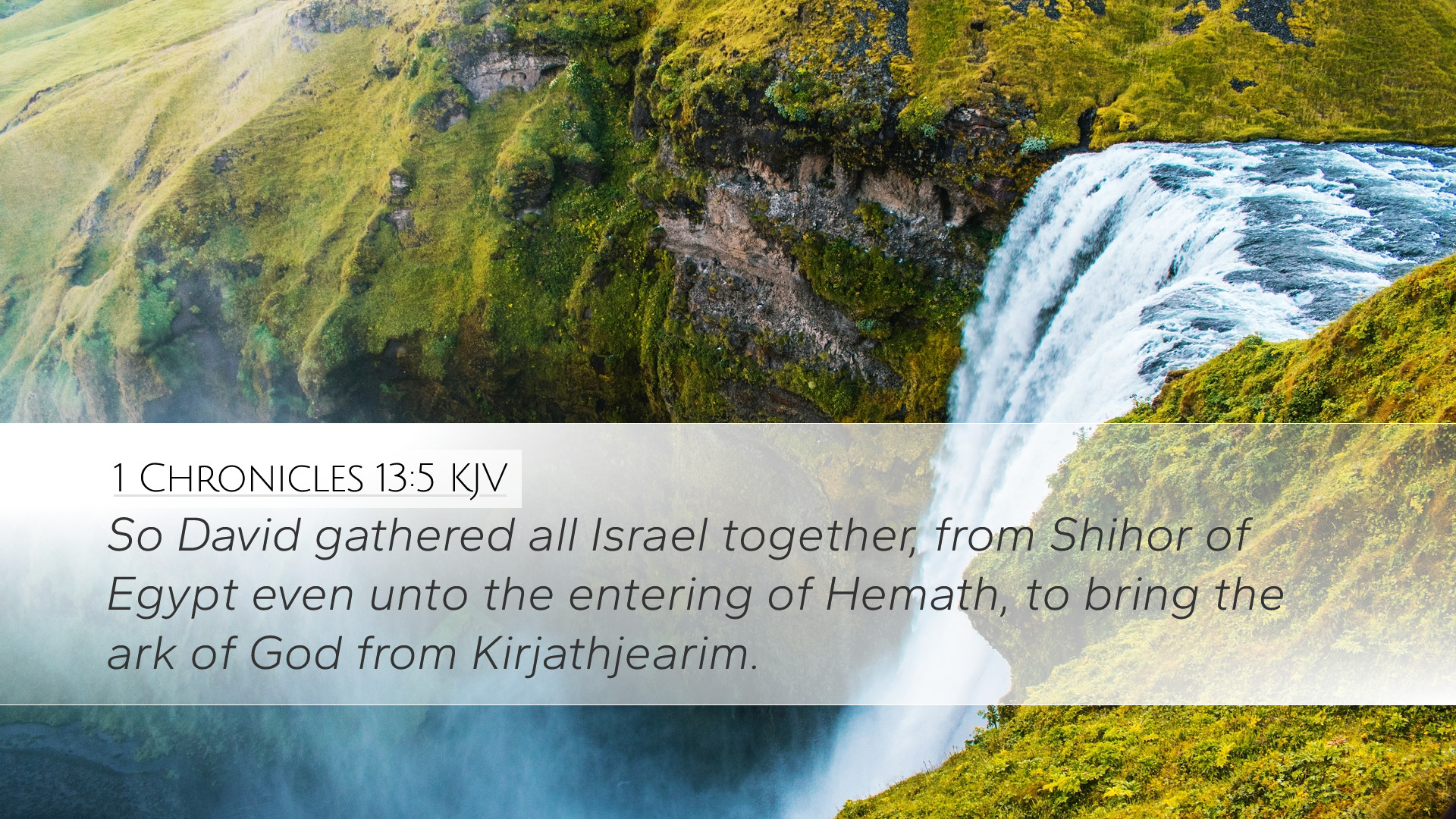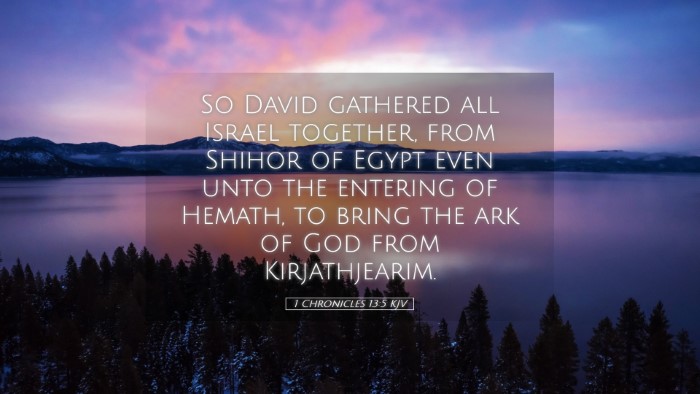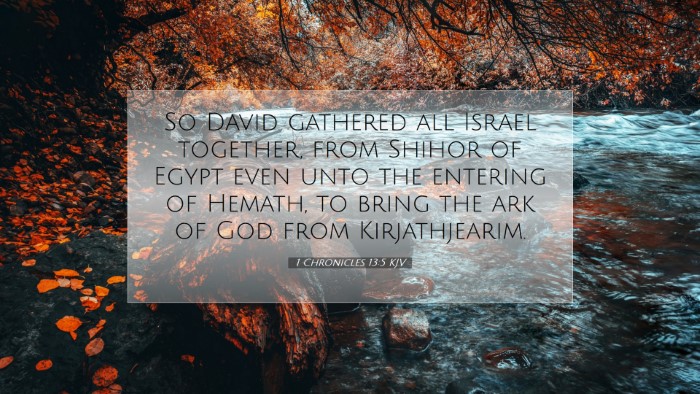Commentary on 1 Chronicles 13:5
Verse: "So David gathered together all Israel, from Shihor of Egypt even unto the entering of Hemath, to bring the ark of God from Kirjath-jearim." (1 Chronicles 13:5)
Introduction
This verse serves as a crucial point in the narrative of the reign of David, detailing his efforts to bring the Ark of the Covenant to Jerusalem. It signifies a pivotal moment in the spiritual life of Israel as well as a key development in David's kingship. Understanding the background, significance, and implications of this event requires examining multiple perspectives from various public domain commentaries.
Gathering of Israel
David's gathering of all Israel demonstrates his commitment to unifying the nation under his rule and towards a common purpose. This action is crucial for several reasons:
- National Unity: By gathering the people, David not only consolidates his power but also promotes national unity. Matthew Henry emphasizes the importance of communal worship centered around the Ark, which symbolized God's presence among His people.
- Spiritual Restoration: Albert Barnes points out that this event seeks to restore the proper worship of Yahweh, as the Ark was central in Israel's relationship with God. David's initiative reflects a desire to realign the nation's spiritual priorities.
- Leadership and Influence: Adam Clarke notes that David’s leadership is evident in his ability to mobilize the people across the extensive territory, highlighting his influence and the respect he commanded among the tribes of Israel.
From Shihor to Hemath
The geographical range specified in the verse, from Shihor to Hemath, signifies the extent of David's authority and the inclusivity of his call. This breadth of gathering implies several important factors:
- Geopolitical Context: Shihor is often associated with the border region of Egypt, while Hemath represents northern boundaries towards Syria. This geographical span indicates David’s recognition of the tribal divides and political landscape of Israel.
- Symbolism of the Ark’s Journey: The Ark's journey can be viewed as a metaphor for Israel’s spiritual journey from captivity (Egypt) to promise (Hemath) through the mediatory power of God's presence, as explained by Henry.
- Inclusivity of Worship: Barnes remarks that David’s directive was an inclusive one, inviting the participation of every tribe, suggesting a kingdom where each tribe has a role in the worship of the One True God.
The Ark of God
Bringing the Ark of God from Kirjath-jearim is not merely a logistical task, but rather a profound act of faith and leadership. The Ark, representing God’s covenantal relationship with Israel, had been neglected and misplaced in their worship practices.
- Significance of the Ark: Albert Barnes highlights that the Ark held tremendous spiritual significance, acting as a physical representation of God's presence. David’s desire to bring it to Jerusalem underscores his longing for a renewed faith among the people.
- Past Failures and Future Hope: Adam Clarke reflects on the notion that previous failures in handling the Ark (such as its capture by the Philistines) emphasize the need for a proper understanding and reverence towards it. David’s action aimed to rectify past mistakes by restoring the Ark to central worship.
- Symbol of Divine Favor: Matthew Henry notes that the Ark's presence in Jerusalem would not only mark a geographic center for the worship of God but also symbolize the divine favor upon David's leadership and the nation.
Theological Implications
This passage opens up numerous theological implications relevant to pastors, scholars, and students of the Word:
- Leadership and Accountability: David’s initiative serves as a reminder of the responsibility leaders bear in guiding their communities towards worship and spiritual truth, provoking discussions on modern church leadership as highlighted by Clarke.
- The Centrality of God's Presence: The Ark’s significance points to the necessity of God’s presence in the life of the believer and the community, prompting reflection on how contemporary practices align with biblical priorities in worship.
- Unity in Diversity: In a divided world, David's gathering teaches the importance of unity among believers, demonstrating that worship transcends geographical and tribal lines, resonating with Barnes’ observations about inclusiveness.
Conclusion
The gathering of Israel and the bringing of the Ark in 1 Chronicles 13:5 encapsulate a defining moment of faith and leadership in ancient Israel. By combining insights from Matthew Henry, Albert Barnes, and Adam Clarke, we see a multifaceted view of how this event challenged the people to unify, to worship authentically, and to recognize the significance of God's presence in their lives. For modern readers—pastors, students, theologians, and Bible scholars—this verse remains a powerful reminder of the responsibilities of spiritual leadership and the calling to draw closer to God's will in a communal context.


